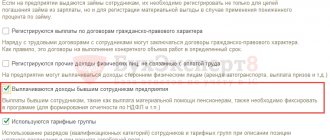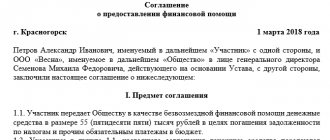Reflection in legislation
Depending on the branch of legal regulation that controls the process of gratuitous transfer of assets, the meaning of the definition of “financial assistance” changes. The Civil Code considers it in the form of a transfer of property by third parties or founders as a gift.
Free financial assistance in accounting is understood as the result of charity or targeted financing. The Tax Code provides for a number of exceptions and additional comments on the taxation of gifted property.
Types of gratuitous assistance
Cash is the main way to provide financial support to an enterprise. They can be transferred from other legal entities and individuals, the state or founders for certain purposes.
Free financial assistance can be provided not only in monetary terms, but also through the transfer of property in the form of fixed assets or intangible assets. For example, the ownership of an enterprise can be transferred to:
- property rights;
- work or services without payment;
- intellectual property;
- securities.
Timely financial assistance on a free basis can bring an enterprise out of a difficult situation and even avoid bankruptcy.
Free transfer of funds
With regard to the size of the contribution, Law No. 14-FZ provides founders with freedom of choice. Contributions to the property of the company can be made by all participants of the company in proportion to their shares in the authorized capital. However, another procedure is possible, but only necessarily enshrined in the company’s charter. Contributions to the company's property are preferably made in cash. At the same time, the provisions of the company's charter or a decision of the general meeting of founders may provide for the contribution of any other property.
Accounting for the provision of property support
An enterprise that has made an act of donating property to another legal entity must necessarily reflect the transaction in its accounting data. According to the instructions of the Ministry of Finance of the Russian Federation, expenses for charity are included in the category of other expenses.
To collect information about transferred donations, account 91 is used. Its structure is active-passive. The provision of gratuitous financial assistance is accompanied by correspondence with 91 debited accounts.
Postings carried out by the benefactor
The process of gratuitous transfer of property (including money) must be documented by both the receiving and the giving party.
Inaccuracies in accounting can lead to violations of tax laws, which entails liability. Typical account assignments reflecting the charity process
| Dt | CT | Characteristics of a business transaction |
| 76 | 51 | Free financial assistance provided |
| 76 | 41 | Goods donated for charitable purposes |
| 76 | 04 | Securities have been transferred to the ownership of another company |
| 91 | 76 | Expenses in connection with the donation of property are included in other |
| 91 | 68 | The amount of VAT charged on the transferred goods |
| 99 | 68 | The tax liability is reflected from the amount of funds transferred free of charge |
To account for the transfer of property, current account 76 is used, which is debited with accounts containing information about the assets donated. After which, the amounts of expenses are written off as a debit to account 91, and also, if necessary, reflect the amount of tax liabilities.
Tax accounting of gratuitous assistance
Providing financial support to other legal entities is regulated not only by accounting standards, but also by the instructions of the Tax Code of the Russian Federation. The main tax payments levied on amounts of property assistance are VAT and income tax.
Legislation in force in 2021 requires enterprises that provide gratuitous financial assistance to allocate funds from their net profits. According to the Tax Code of the Russian Federation, expenses associated with charity and targeted contributions are not included in the calculation of the taxable base.
Accounting with the borrower
Guided by clause 29 P(S)BO 13, the borrower is obliged to initially evaluate financial liabilities (loans) and record them at actual cost, which consists of fair value
liabilities (loan amount) and costs directly related to the acquisition of a financial instrument.
Similar to the situation described for the lender, the fair value of the loan received will be equal to the value of all future cash flows discounted at the market interest rate for a similar instrument. Cash flows associated with short-term accounts payable are not discounted if the effect of discounting is immaterial.
According to paragraph 31 of P(S)BO 13, for each reporting date subsequent after recognition, financial liabilities are measured at amortized cost
, except for financial liabilities intended for resale and liabilities on derivative financial instruments.
So, as we see, on the date of purchase of repayable assistance (loan), the borrower can also determine the current (fair) value of his obligation. The amount of the discount (the difference between the future and today's value of the obligation) is included in income at the time the loan is received and in expenses - in the process of amortizing such a discount over the life of the loan.
We will demonstrate the above rules with an example.
| Example | |||
| On January 1, 2014, the lender provided interest-free repayable financial assistance (loan) in the amount of UAH 1,000,000. for a period of 4 years, refundable at the end of the term. The average interest rate for similar loans is 20%. Let's calculate the current (today's) cost of the loan on the date of its recalculation: PV = 1,000,000 / (1 + 0.2)4 = 482,253.09 UAH. We will calculate the amortization of the discount over the entire period of using the loan. | |||
| date | Discount rate | Discount amortization | Book value |
| 01.01.2014 | — | — | 482 253,09 |
| 01.01.2015 | 20 % | 96 450,62 | 578 703,70 |
| 01.01.2016 | 20 % | 115 740,74 | 694 444,44 |
| 01.01.2017 | 20 % | 138 888,89 | 833 333,33 |
| 01.01.2018 | 20 % | 166 666,67 | 1 000 000,00 |
VAT
In 2021, enterprises can count on benefits when paying VAT. The transfer of property rights, services, works or goods free of charge is not subject to VAT. It is worth considering that the list does not include excisable products.
To obtain rights to the benefit, you must comply with the requirements of Law No. 135 Federal Law, which details the list of charitable activities that fall under VAT exemption. If an enterprise is engaged in financial support of a legal entity using transactions, both subject to VAT and non-taxable, they should be kept separately.
What to consider when providing charitable assistance
Today, the issue of charitable assistance is more relevant than ever. A huge number of businessmen provide free assistance to citizens, charitable organizations and medical institutions: they make monetary donations, provide premises, cars, free lunches, food, medical products, medicines, personal protective equipment.
Of course, the life and health of people are the determining factors, and few people think about what tax consequences arise for the benefactor. And they may turn out to be an unpleasant surprise if you do not take into account some of the nuances of tax legislation, the official position of controllers and judicial practice.
Thus, if assistance is provided in the form of a transfer of funds, the issue of charging VAT on such transfer does not arise; this is not recognized as the sale of goods (work, services) for the purposes of imposing this tax (subclause 1, clause 3, article 39, subclause 1 Clause 2 of Article 146 of the Tax Code of the Russian Federation). There will be no issues with VAT calculation even when the benefactor uses a special tax regime or is exempt from paying this tax.
If goods are transferred (work is performed, services are provided), it is necessary to pay attention to the documentation of this assistance. In particular, the norm sub. 12 clause 3 art. 149 of the Tax Code of the Russian Federation provides for exemption from VAT if goods (work, services) are transferred as part of charitable activities.
At the same time, VAT exemption is not applicable when it comes to the transfer of excisable goods (for example, the transfer of disinfectants). The exemption does not apply in the case of a sponsorship contribution: it is not a charitable donation, is of a targeted nature and involves reciprocal obligations of the parties to provide advertising services1.
At the same time, both the Ministry of Finance of Russia and the Federal Tax Service for Moscow insist that in order to confirm the right to exemption from VAT, the following documents must be submitted2:
- agreement on the gratuitous transfer of goods (work, services), property rights;
- act of acceptance and transfer of goods (work, services), property rights or other document confirming the transfer;
- documents proving the intended use of the received.
In the absence of supporting documents, there is a high risk that the benefactor will not be able to confirm the right to VAT exemption.
In fairness, I note that the norms of Ch. 21 of the Tax Code of the Russian Federation does not provide a list of such documents. In accordance with the norms of civil law, a donation is a unilateral transaction and does not require anyone’s consent to accept it (clause 2 of Article 582 of the Civil Code of the Russian Federation). This means that additional bilateral documents are not required.
Judicial practice, in turn, is also ambiguous. Some courts proceed from the fact that the receipt of funds as part of charitable assistance is confirmed by a letter from the recipient with a request to transfer money for certain purposes and a payment order for the transfer of funds by the benefactor3.
Others believe4 that unilateral donations (without concluding an agreement) are consistent with the provisions of the Federal Law “On Charitable Activities and Volunteering (Volunteering)”: the transfer of goods (services) is carried out on the basis of relevant orders and letters.
Considering the contradictory positions of official bodies and courts, it is still advisable to create a package of documents confirming the transfer of goods (work, services) for charitable purposes. This will help reduce risks and confirm the meaning of the business transaction5. Of course, this issue must be approached from the standpoint of economic feasibility.
Another important point: if goods (property) were specifically purchased for the purposes of charity, then the VAT paid upon their acquisition is not deductible, but is included in the cost of these goods (property) (subclause 1, clause 2, article 170 of the Tax Code RF). If such goods (property) were purchased for transactions subject to VAT earlier and VAT on them was accepted for deduction, it will have to be restored in the tax period when the goods (property) were transferred for charitable purposes (clause 3 of Article 170 of the Tax Code of the Russian Federation ). However, since the restored VAT is related to charitable activities (and will not meet the requirements of Article 252 of the Tax Code of the Russian Federation for accounting for expenses), it should be taken into account as part of other expenses (as provided in general cases according to the rules of subparagraph 2, paragraph 3, Article 170 of the Tax Code of the Russian Federation ) is extremely risky. It can be predicted with a high degree of probability that such an expense will be refused to be taken into account for income tax purposes.
Also, if the share of expenses for non-taxable transactions exceeds 5% of the total amount of expenses (paragraph 7, paragraph 4, article 170 of the Tax Code of the Russian Federation), an obligation arises to keep separate records of taxable and non-taxable transactions and amounts of “input” VAT (paragraph 4, article 149 , clause 4 of article 170 of the Tax Code of the Russian Federation). This requirement is also relevant when carrying out charitable activities6.
In addition, you can refuse to apply this exemption for a period of at least a year by submitting a corresponding application to the tax authority at the place of registration no later than the first day of the tax period from which you intend to refuse the exemption or suspend its use (clause 5 of Article 149 of the Tax Code of the Russian Federation ).
As for income tax, expenses in the form of the cost of gratuitously transferred property (work, services, property rights) and expenses associated with such transfer are not taken into account as expenses, since they do not meet the requirements of Art. 252 of the Tax Code of the Russian Federation (clause 16 of Article 270 of the Code)7. Exceptions to charitable assistance norms of Ch. 25 do not contain NC.
The amount of targeted contributions made for the maintenance of non-profit organizations (clause 34 of Article 270 of the Tax Code of the Russian Federation), as well as funds and other property, property rights transferred for the maintenance of non-profit organizations, including charitable activities, cannot be taken into account as part of expenses. 2 Article 251 of the Code).
Since expenses for goods (work, services) donated in the form of charitable assistance are not related to the receipt of income, take advantage of the provisions of sub-clause. 20 clause 1 art. 265 of the Tax Code of the Russian Federation (regarding the possibility of taking into account other justified non-operating expenses) will not work.
It should be borne in mind that not only the costs of purchasing goods (work, services) donated for charitable purposes cannot be accepted, but also depreciation on fixed assets for the period of their transfer for free use, as well as labor costs (and insurance premiums) of personnel involved in the production of goods (works, services) donated to charity, and other similar expenses.
When calculating the single tax under the simplified tax system (the “income minus expenses” base), a similar rule applies: the expenses specified in Art. 270 of the Tax Code of the Russian Federation, not accepted8.
The laws of constituent entities of the Russian Federation may establish the right to reduce the amount of tax (advance payment) subject to credit to the revenue side of the budgets of these constituent entities - the use of an investment tax deduction when calculating income tax (clause 1 of Article 286.1 of the Tax Code of the Russian Federation). Please note that:
- this right must be provided for by the law of the subject of the Federation (but not everywhere such laws have been adopted);
- donations must be transferred to state and municipal institutions operating in the field of culture, as well as non-profit organizations (funds) for the formation of endowment capital in order to support these institutions. That is, if assistance is provided, for example, directly to citizens, it will be impossible to apply a deduction;
- The right to deduction does not apply to all organizations (this applies, for example, to residents of special economic zones, participants in regional investment projects, free economic zones, territories of rapid socio-economic development. The list of such organizations is established by clause 11 of Article 286.1 of the Tax Code of the Russian Federation).
For charitable organizations, the laws of the constituent entities of the Federation may also provide for reduced tax rates to be credited to local budgets (clause 1 of Article 284 of the Tax Code of the Russian Federation). To do this, it is necessary that the subject of the Russian Federation adopts the appropriate law and meets the conditions for applying the reduced rate provided for by this law (such laws have not been adopted everywhere).
If the benefactor is an individual (including an individual entrepreneur), he has the right to receive a social tax deduction (clause 3 of Article 210, subclause 1 of clause 1 of Article 219 of the Tax Code of the Russian Federation). This right can be exercised subject to the following conditions:
- The deduction applies only to income taxed at a rate of 13%. That is, for example, individual entrepreneurs using the simplified tax system, UTII and patent will not be able to take advantage of the deduction;
- the deduction is provided in the amount sent by an individual during the year for charitable purposes in the form of monetary assistance to certain categories of recipients (charitable and religious organizations, NPOs. The list and some conditions are given in paragraph 1 of Article 219 of the Tax Code of the Russian Federation). If assistance was provided to citizens, the right to deduction does not arise;
- You cannot claim a deduction even if the assistance was provided in kind. True, there are examples when the courts did not agree with such an interpretation10. In these cases, there is a risk of a dispute with the tax authority;
- the deduction cannot exceed 25% of the income received by an individual for the year.
In addition, the balance of the deduction not used in the tax period is not carried over to the following tax periods.
The law of a subject of the Federation may increase the maximum deduction amount (but not more than 30% of the amount of an individual’s income) and establish categories of state and municipal institutions operating in the field of culture, and non-profit organizations (foundations), donations to which can be accepted for deduction in the increased maximum size.
To summarize, I would like to express the hope that in the current difficult economic conditions, one of the support measures will be the actions of the authorities, which, by reducing the tax burden, will support those who, in very difficult conditions, have shown civic responsibility by providing much-needed assistance now.
In addition, at a meeting with volunteers held on April 30, Russian President Vladimir Putin announced the need to support charitable organizations.
1 Letter of the Ministry of Finance dated September 1, 2009 No. 03-03-06/4/72.
2 Letter of the Ministry of Finance dated October 26, 2011 No. 03-07-07/66, letters of the Federal Tax Service of Russia for Moscow dated December 2, 2009 No. 16-15/126825, dated March 5, 2009 No. 16-15/019593.1 , dated August 2, 2005 No. 19-11/55153.
3 Resolutions of the Federal Antimonopoly Service of the Moscow District dated January 26, 2009 No. KA-A40/13294-08 in case No. A40-3912/08-129-16, dated January 9, 2008 No. KA-A40/13490-07-2 in case No. A40-74705/06-126-466, FAS North-Western District dated November 17, 2005 in case No. A56-11300/2005.
4 See, for example, Resolution of the Federal Antimonopoly Service of the East Siberian District dated August 18, 2005 No. A58-5044/04-F02-3966/05-S1.
5 Resolutions of the FAS Volga District dated November 10, 2005 in case No. A55-2057/2005-29, FAS North Caucasus District dated August 21, 2013 in case No. A32-26727/2012.
6 Resolution of the Federal Antimonopoly Service of the Moscow District dated October 11, 2011 in case No. A40-138316/10-90-799.
7 See also letters of the Ministry of Finance of Russia dated April 16, 2010 No. 03-03-06/4/42, dated April 4, 2007 No. 03-03-06/4/40.
8 Clause 2 art. 346.16 Tax Code of the Russian Federation. See also Resolution of the Federal Antimonopoly Service of the Ural District dated June 26, 2012 No. F09-4813/12 in case No. A50-19121/2011, Letter of the Ministry of Finance of Russia dated April 15, 2005 No. 03-04-14/06.
9 Letter of the Ministry of Finance of Russia dated March 2, 2010 No. 03-04-05/8-78.
10 Resolutions of the Federal Antimonopoly Service of the Ural District of December 8, 2008 No. F09-9086/08-C2 in case No. A50-6933/08, of the Volga District of June 28, 2006 in case No. A12-29703/05-C51.
Documentation of donation of property
The provision of gratuitous financial assistance must be recorded in documents. The exception is cases of transfer of funds to non-profit organizations that do not pursue the goal of using the funds for business activities. In other cases, the company must have the following documents on hand:
- agreement with the party receiving financial assistance;
- copies of accounting registers on the acceptance by beneficiaries of amounts for accounting;
- confirmation of the intended use of the funds received.
The list contains the main papers that are necessary to formalize the act of charity. In some cases, additional documents may be required.
All types of reporting for non-profit organizations (NPOs) for 2021
- Form 4-FSS . Submitted to the social insurance fund if the number of employees exceeds 25 people. The dates for submitting documents electronically and in paper form differ: paper submissions must be submitted by January 20;
- Electronic calculations are allowed to be submitted until January 25.
- February 15, if the report is generated on paper;
Entities of this kind can carry out commercial activities, but only if it is intended to achieve the goals of the company and the distribution of income received among the founders is not intended. Their activities are regulated by Law No. 7-FZ.
Accounting for receiving financial assistance
According to the instructions for using the standard chart of accounts, passive account 98 (subaccount 2) is used to reflect information on the amounts of gratuitous receipts. In this case, the accounts of the property transferred into possession are debited.
As the allocated funds are used, the amounts are recognized as non-operating income, partially written off to account 91.1. This is necessary according to PBU: assets received free of charge as a result of charity are considered non-operating income and must be reflected in account 91. A decrease in the amount of assistance received occurs when:
- release into production of MPZ;
- calculation of depreciation charges;
- repayment of accounts payable;
- carrying out other operations using targeted financing.
Accounting data must fully reflect the sources of non-operating income and the conditions for their application.
Tax accounting for amounts received free of charge
Enterprise finances received as a gift are subject to special taxation. VAT is required to be paid only in cases where:
- the organization uses the received goods for further sale;
- donated products are excisable;
- assistance is provided in the form of goods, services or works, as well as fixed assets and intangible assets, which will then be transferred to third parties.
Donated amounts, as a rule, are included only in the calculation of the beneficiary’s income tax, and VAT is not paid on the funds. The enterprise receiving assistance is obliged to take it into account when calculating income tax if at least one of the conditions is violated:
- its initial capital consists of 50% or more of the contribution of the benefactor;
- The authorized capital of the organization providing assistance consists of 50% or more of the contribution of the beneficiary.
Thus, only financial assistance from the founder is not included in the calculation of income tax. If the funds were received from third-party legal entities or individuals, the beneficiary is required to include the amount in the calculation of income tax.
In cases where the party receiving assistance is an individual, personal income tax must be paid.
Founder's investment in his own business
An alternative to increasing the authorized capital is the founder (participant) providing financial assistance by making a contribution to the property. This method can only be used by limited liability companies (Article 27 of the LLC Law), and only if the company has one participant or all participants agree to contribute money as a contribution to the property. The funds received as a contribution can be used by the company for any purpose; the company does not have any counter-obligations to the person who provided financial assistance in this way.
We recommend reading: What Documents Are Needed to Register a Country House Under the Dacha Amnesty
Postings with gratuitous financing
Let's consider typical operations carried out by an enterprise accountant when receiving financial assistance.
Account assignments made when accepting a gift for accounting
| Dt | CT | Characteristics of a business transaction |
| 51 | 98.2 | Funds received free of charge |
| 60 | 51 | The money was used to pay for purchased supplies |
| 10 | 60 | Materials accepted for accounting |
| 98.2 | 91.1 | Part of the financial assistance amount is included in non-operating income |
| 66 | 51 | Funds of gratuitous support for loan repayment were transferred |
| 68 | 99 | Tax asset accrued on profit from financial assistance |
| 19 | 60 | Accepted for accounting for VAT on excisable goods received free of charge |
After using financial assistance funds, they must be reflected in the item of non-operating income.
Accounting of founder's contributions
The finances of the enterprise are mainly formed from the authorized capital and subsequent investments of the founders. The legislation does not limit the frequency of contributions and their size. In addition, if the authorized capital of the recipient of financial assistance consists of 50% or more of the sender’s funds and vice versa, then the amount is not taken into account when calculating income tax.
In accounting, the assistance of the founder is reflected in the following entries:
- Dt 51 Kt 98.2 - for the amount that was received from the depositor free of charge.
- Dt 98.2 Kt 91.1 – the amount of financial assistance is included in other income.
- Dt 68 Kt 99 – reflects the tax liability on the amount of assistance (carried out in cases where the conditions of Article 251 of the Tax Code of the Russian Federation are violated).
Thus, only 2–3 account assignments describe gratuitous financial assistance. Postings in 1C are identical to those described for accounting without using the program.
Donating to a non-profit organization (NPO)
According to Art. 582 of the Civil Code of the Russian Federation, a donation is the gift of a thing or right for generally beneficial purposes. It is legislatively established that the beneficiary, under a donation agreement, can be a non-profit organization, in favor of which any item that has not been withdrawn from civil circulation can be donated. Such organizations are subject to “double control” when using the gift:
Each non-profit organization approves its own form of financial statements based on the recommendations of the Ministry of Finance of the Russian Federation. If the organization does not conduct business activities, then the following items do not need to be indicated in the accounting report:





